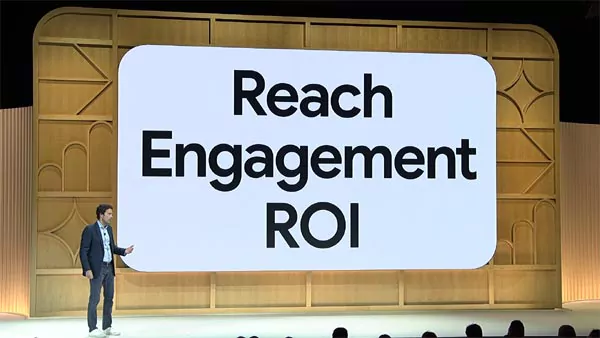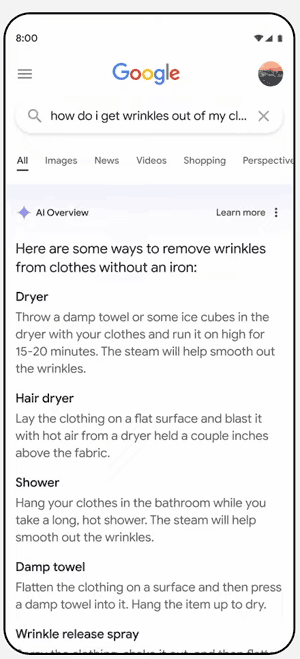

Last updated on

Presenters at Google’s Marketing Live conference showcased their strategy for leveraging user search queries and AI-generated content to present dynamic shopping ads. They emphasized that these ads will further diminish the prominence of organic search results, emphasizing Google’s commitment to expanding avenues for business growth.
During Google’s Marketing Live event, Philipp Schindler, SVP & Chief Business Officer at Google, broke the usual silence on the matter by openly stating that the primary purpose of search results is to display advertising. This declaration came within the context of introducing a new AI video tool aimed at assisting YouTube creators in generating more content.
At the 18:19 minute mark of the event, Schindler proudly announced:
“We’ve collaborated with exceptionally talented filmmakers, musicians, and artists, yielding extraordinary results. Soon, we’ll integrate video into shorts, unlocking a realm of creative possibilities for both you and your brands. Just envision every creator equipped with the power of AI at their fingertips.
So, what does this signify for you? With more creators producing higher-quality content, we attract more viewers, resulting in expanded reach, engagement, and ROI for your business. Our focus extends beyond merely enhancing a search engine or YouTube; we’re dedicated to creating fresh opportunities for your business.”

Schindler’s acknowledgment that Google utilizes AI Overviews and Search to enhance advertisers’ reach and ROI wasn’t an isolated incident. Subsequent speakers echoed the same sentiment.
Vidhya Srinivasan, VP/GM, Advertising at Google, began her address by outlining how search experiences will continue to direct traffic to websites. However, she swiftly transitioned to demonstrate how interactive advertising will effectively sideline organic search listings, potentially placing them beyond users’ immediate view.
At the 30-minute mark of the presentation, Srinivasan elaborated:
“AI Overviews will now feature in search results when they offer assistance beyond the current capabilities of search. As we refine and innovate the search experience, our primary focus remains on directing valuable traffic to publishers and creators. However, expanding avenues for user exploration translates to increased options, which in turn creates more opportunities for advertisers.
You may have observed that we already display ads both above and below AI Overviews, tailored to match the user’s search query. Now, we’re embarking on testing Search and Shopping ads within AI Overviews for users in the US.
What’s novel about this approach is that we’re not only aligning these ads with the query context but also with the information provided within the AI Overviews. Of course, as always, these ads will be prominently labeled.”


She proceeded to illustrate an instance involving crumpled clothing during travel, recounting how she resorted to Google Search for solutions to prevent such creases. She demonstrated a search activity for travel tips, revealing how organic search results were overshadowed by the AI Overviews feature and new Search and Shopping ads, boasting product images that stood out prominently.
Detailing how the revamped AI Overviews shopping ads were tailored to entice searchers into making purchases, she remarked:
“Upon accessing the AI overview, I swiftly unearthed various promising travel hacks. While perusing the array of options presented, I stumbled upon an intriguing solution—a wrinkle release spray previously unbeknownst to me. It seemed like the perfect remedy. I’m eager to give it a try.
Thanks to this feature, I can now seamlessly click on the ad and make a purchase right then and there.
Our aim is to streamline the process for consumers, enabling them to take prompt action. This is just one instance showcasing the implementation of Gen AI. There are numerous other applications in search ads that we’ll be introducing soon.”

Google’s search engineers leverage cutting-edge technology and data to generate the most beneficial search outcomes in Google’s history, marking a pinnacle of efficiency. However, despite Google’s mission to “organize the world’s information and make it universally accessible and useful,” the true directive from the higher echelons of the company appears to prioritize expanding “reach, engagement, and ROI” for advertisers. This misalignment prompted Sam Altman to characterize Google’s approach as dystopian, shedding light on the underlying motivations behind the search engine’s evolution.
Social engineering involves manipulating people’s behavior to achieve specific outcomes. Google has effectively influenced a significant portion of the web ecosystem by promoting concepts such as Core Web Vitals and the principles of Experience, Expertise, Authoritativeness, and Trustworthiness (E-A-T) to enhance user satisfaction, even though this may not have been their original intention.
The individuals at Google who are dedicated to refining search algorithms genuinely strive to deliver quality results. However, it’s evident that Google’s primary mission has shifted away from simply making information accessible and useful. This shift may evoke a sense of dystopian concern, as Google has effectively shaped the priorities of the search community and content publishers towards creating helpful content that ultimately benefits advertisers in maximizing ROI.
Moreover, it’s not just SEOs and publishers who have been leveraged for the benefit of advertisers.
Original news from SearchEngineJournal